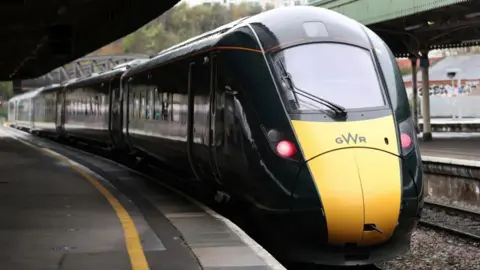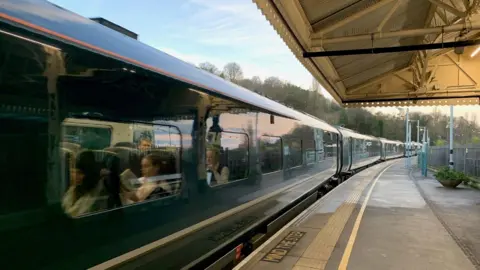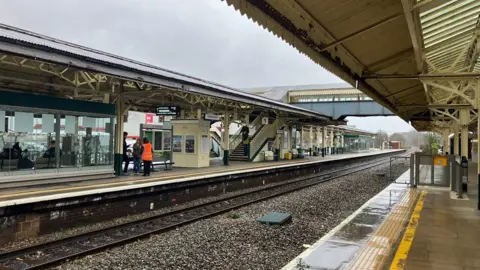What is behind the weekend problems for GWR trains?
 PA Media
PA MediaCancellations and delays have been a feature of Great Western Railway (GWR) services over the winter.
The operator runs services to and from London to the south-west of England and to Wales.
The firm has issued several "don't travel" warnings and asked passengers to consider travelling on different days. But what is behind all of these problems?

What is happening with GWR on Sundays?
Some train operators, including GWR, rely on train crews volunteering to work overtime because, under their terms and conditions, Sunday does not count as part of their working week.
It means that a lot of train services have been cancelled at the last minute, due to staff shortages.
GWR has warned that trains are likely to be very busy during the festive period.
The company has issued warnings advising people not to travel by train to Bath on the penultimate Sunday before Christmas.
 GWR
GWRWhy do they not have enough people on Sundays?
Several drivers have told the BBC that a recent pay deal means they do not need the extra money they earn by working on their rest days.
The deal included an element of backdated pay for the previous two years, which means drivers received a lump sum in their autumn payslips.
And it has traditionally been harder to persuade drivers to work voluntary overtime during the weeks running up to Christmas.
The drivers' union, Aslef, said it has argued for 20 years that Sunday should be included in the working week.
But it said that would require employing a larger number of drivers.
In the past, it has suited train companies to pay overtime instead. They found that it was both cheaper for the employer and provided staff with the opportunity to earn more money.
GWR spokesman Dan Panes said: "60 per cent of our staff are not contracted to work on a Sunday. They can choose to work or not."
He added: "We would like to bring Sundays into the working week, and we are talking to government and our industry partners.
"It will take quite some time to fix."
Since 2018, new Great Western driver recruits have been contracted to work across a seven-day week. Some drivers of suburban services in the Thames Valley are also on a seven-day agreement.
But older long-distance drivers are not.

What are passengers saying about this?
Passenger Val said on X: "All Sunday travel with GWR is an utter car crash. I do believe all the drivers who comment there simply aren't enough of them. Are either the train operators or the government pushing for change?"
Bristol passenger Matt Dinio commented on X: "This makes no sense for an essential service that the country relies on."
"It's a joke and clearly the service is not fit for purpose," said passenger Paul Owen.
Writing on the BBC Bristol Facebook page, Mr Owen said: "Used the train four times and three times I've been left either stranded or had the journey significantly disrupted."
Andrew Musty also commented: "It's disgraceful that GWR is advising passengers not to travel to Bath by train on one of the busiest Sundays before Christmas."
Bruce Williamson from the campaign group RailFuture, said: "It's not a satisfactory situation where the train operators are saying 'don't use the trains'.
"Clearly, something is very wrong there."
Speaking about the popular Bath Christmas market, he said: "People rely on the trains as a better alternative, and if that alternative is not available, that's very, very frustrating and and bad for business in Bath as well.
"In spring, rail fares will go up again by above inflation, and all of this is driving people off the railways and and onto the roads, adding to more pollution and more congestion."
What happens if I am delayed travelling
If your journey is delayed by 15 minutes or more, you can claim compensation through the GWR Delay Repay scheme.
How much you get will depend on the type of ticket you have and how late you arrived at your destination.

Who else is affected?
Great Western is by no means the only train operator affected. Northern and ScotRail passengers also endured many cancellations last Sunday.
Other companies, including South Western Railway, roster drivers across a seven-day week.
The national pattern of train crew terms and conditions is not consistent.
Another challenge is a looming "retirement bulge" of drivers: the average age has been rising steadily and the National Skills Academy for Rail (NSAR) estimates that one in three drivers nationally will retire within ten years.
For passengers, travelling by train will be made more difficult by extensive engineering work over the festive period.
There will be no trains in or out of London Paddington from 27 to 30 December, because of work to build a new HS2 station at Old Oak Common in West London.
It means most GWR services will start or terminate at Reading - or divert to Euston.
Passengers from Reading will be able to change to Elizabeth Line services to Ealing, and then take the Underground.
A small number of long-distance trains will divert to London Euston. These trains will not call at Reading, and will be reservation-only.
Great Western Railway has warned that trains are likely to be very busy.
The work at Old Oak Common will cause intermittent disruption to Great Western passengers for at least the next four years.
